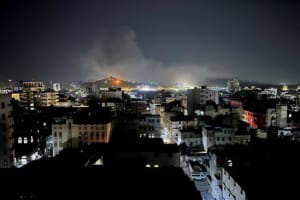Hamas used 2021 ceasefire to prepare for Oct 7 massacre while luring Israel into believing it was deterred
Documents reveal Sinwar’s shrewd reading of Israeli and Western leaders and devious planning

Over the weekend, Israel’s Channel 12 revealed documents seized in Gaza during the Oct. 7 war, which demonstrate how Hamas deceived Israeli leaders into believing it was defeated and reticent to engage in conflict, while it was actually preparing for the deadly massacres.
The documents contain internal correspondence between Hamas leaders, which reveal a clear strategy to exploit the internal weaknesses and division within Israeli society. One of the clear revelations in the correspondence is how the military leader of Hamas at that time, Yahya Sinwar saw the proposal for a ceasefire (hudna in Arabic) as a winning strategic move that would back Israel into an unwinnable scenario.
"It is likely that this move [the hudnah], which will be acceptable to most countries in the world, will not be acceptable to the occupation [Israel] and will therefore increase their isolation and disconnection from them. And if the occupation decides to go in this direction, it will tear it apart from within and lead to an internal rift and a civil war," Sinwar wrote to Ismail Haniyeh, then head of Hamas' political bureau.
Sinwar also noted the shift in international public opinion away from Israel as the media, with the encouragement of Hamas and its supporters, focused on Palestinian casualties in the brief but intense fighting.
“It is possible to build on the strategic shift that has occurred in global public opinion, particularly in the American and European arenas,” Sinwar explained to Haniyeh, “whose early signs began to appear during the Sword of Jerusalem campaign.”
The documents reveal that Operation Guardian of the Walls was seen by Hamas as a critical turning point in its strategy. After the end of the conflict, Hamas began to believe that its goal of defeating Israel was a realistic goal, if it could secure the assistance of other elements in the Middle East.
Hamas leadership began to express this opinion in correspondence with its Iranian sponsors.
In a letter dated June 5, 2021, Hamas leaders Yahya Sinwar, Mohammed Deif, and Marwan Issa wrote to Iranian Qods Force commander Esmail Qaani, asking for financial assistance. They reaffirmed the goal of Hamas was “the great victory and the removal of the cancer” and “the elimination of the entity and its removal from our land and holy places.”
They requested a sum of $500 million to be given over a two year period.
“We are confident that by the end of these two years or during them, if Allah wills, we will uproot this distorted entity, and together we will change the face of the region and ultimately, if Allah wills, this dark era in the history of our nation…”
Sinwar also described the strategic decision to pivot away from Egypt as a partner in negotiations and towards Qatar, saying, “the Qataris are more loyal to us, dedicated, affectionate, and give generously.”
Sinwar showed a shrewd understanding of Western sensibilities and political leanings, and how they could be used to pressure Israel, without putting any pressure on Hamas. Again, he spoke of a crucial role for Qatar in achieving this aim.
“We agree to a truce of many years in exchange for the occupation’s withdrawal from the West Bank and east Jerusalem, the dismantling of the settlements, the release of the prisoners and the lifting of the blockade on Gaza. That is a very strong card that Qatari diplomacy can maneuver with and use powerfully as part of a series of contacts with the American administration, European countries, Russia, China and others,” he told Haniyeh, who was at that time living in Doha, Qatar.
Haniyeh congratulated Sinwar, saying, “We welcome the clear decision. The flag of our Al-Qassam movement was raised all over the world, and millions cheered for the dear Chief of Staff of the Resistance, Muhammad Deif, who won a heavenly and glorious victory.”
Sinwar’s reply showed his growing confidence.
“Praise be to Allah for giving us victory, humiliating the enemy's leadership, we are close to destroying his country.”
The Hamas leaders also publicly described the operation, which it called Operation Sword of Jerusalem, as a success. In the days following the beginning of the ceasefire, Hamas leaders declared the operation a strategic victory and downplayed the level of damage to their military capabilities.
The group claimed to have launched the operation as a defensive operation against the “crimes and aggression of the enemy in occupied Jerusalem” and “harassment of the residents of Sheikh Jarrah and al-Aqsa Mosque.”

The All Israel News Staff is a team of journalists in Israel.














